How to Fix BSOD Error C:\Windows\System32\Logfiles\Srt\SrtTrail.txt?
Feb 05, 2026 • Filed to: Windows Computer Solutions • Proven solutions
Coming across any Windows error, in general, can get frustrating at times. SrtTrail.txt is one such error where your computer gets stuck in the endless loop. Generally, the best way to identify the error, when you come across the message "MACHINE_CHECK_EXCEPTION BSOD error." The sole idea behind this article is to give you tips and tricks towards fixing the error.
Why does the error c windows system32 logfiles srt srttrail txt occur?
For the majority of the time, Windows 10 is considered to be a fairly stable operating system. But, sometimes, the SrtTrail.txt BSOD error can really get under your skins. Windows 10 already comes with an automatic repair utility tool. This generally helps to fix all the start-up errors. Under normal circumstances, when your PC goes through a start-up error, you have only two options to choose from. Either go with "System shutdown" or opt for "Advanced repair."
Opting for the second option tends to make the system go on an endless loop of start-ups and shutdowns. Some of the most common issues behind the problem include:
- Corrupted Window/ Software: Back in Windows 1809 update, many users started to encounter the same problem. After several Microsoft update iterations, they have finally fixed the issue from their end. Sometimes incompatible or corrupted software can also be the underlying reason for the same.
- Hardware Malfunctions: The idea of hardware malfunctioning is pretty general. One of the most common problems includes the power supply overload. For other times, adding incompatible hardware like an unsupported PCI express card or a higher clock frequency of RAM can also do the damage.
- Malware Attacks: A virus attack can easily corrupt your Windows Registry. This, in turn, can cause the SrtTrail.txt error. For this particular problem, the best course of action is to give your Windows a clean installation.
Solution 1: Run the CHKDSK command
One of the niftiest features of Windows includes the CHKDSK (Check Disk) option. It enables Windows to check for hard drive errors while running the repair program at the same time. This is something that can come handy if there is any non-physical error to the hard drive. To run the CHKDISK command, follow the steps down below:
Step 1: Press the Windows Key + X and then select the option "Command Prompt – Admin".
Step 2: Then type in the command "CHKDSK" followed by the drive you want to check
Step 3: For Windows related errors choose the C drive and hit enter

Now, if you don't want to go along with the command line, there's another way as well. Follow the steps down below to run the GUI version of CHKDSK.
Step 1: At first, open the File Explorer and then head over to "This PC." Right-click on the drive you want to scan and select "properties."

Step 2: Once the properties windows show up, head over to the "Tools" section, and click on "Check."

Step 3: Sometimes you might come across the message that everything is fine. You can ignore the same while selecting the option "Scan drive."

Step 4: Wait for the scan to complete, and you will be greeted with a success message.


Solution 2: Repair the corrupt Windows registry
Repairing any corrupted registry is as easy as it can ever get. One of the best ways to do the same is by running the system update readiness command. It helps the computer to detect all the incorrect registry data, manifests, or cabinets. The corrected version readily replaces incorrect data. To fix the registry, make sure to go through the steps down below:
Step 1: Press "Windows + X" key and select "command prompt (Run as administrator)" option
Step 2: Enter the following commands:
- DISM.exe /Online /Cleanup-image /Scanhealth
- DISM.exe /Online /Cleanup-image /Restorehealth
Solution 3: Refresh or reset your system
If you have come across the SrtTrail.txt error after a recent Windows update, the best course of action is to opt for Windows recovery. Assuming that you have already created a restore point for your Windows, you can always revert to its initial condition. To restore the computer, make sure to go through the following steps:
Step 1: Head over to start and search for "Create a restore point." Select the first search result and click on "System Restore."

Step 2: Now select next and choose the restore point you want to revert to.

Step 3: Select "Next" and then "Finish" to complete the entire restoration process.

Using System Restore When You Can't Access Your Computer
Step 1: Head over to the "Advanced options" by starting and shutting down your PC for three times.

Step 2: Click on "Troubleshoot."

Step 3: Select "Advanced Options."

Step 4: Now select "System Restore" and go through the steps as mentioned in the above section.

Solution 4: Run a Disk Check and SFC
To run a Disk Check and SFC, you need to head over to the "Advanced options." You can enter into Windows recovery by consecutively starting and shutting down your PC for three times. No head over to Troubleshoot > Advanced options > Command Prompt.
Type the following commands:
- chkdsk c: /f
- sfc /scannow
Your computer will automatically detect and fix any issue related to the disk.
No Solution Worked? – Try This Bonus Tip!
If you are still in this section, chances are the rest of the solutions didn't work out for you. But, there's one last try you can give before completely wiping your computer. Follow the steps down below:
Step 1: First, shut down your computer and turn it back on
Step 2: Keep pressing "Esc" key until the start-up menu comes up
Step 3: Press the "F2" key, and it will take you back to the component testing
Step 4: Select the Hard Disk (Extensive) Test
Step 5: Once the test passes, you can now perform recovery
How to recover data from the computer when all solutions fail to fix the issue?
As stated earlier throughout the article, there are several reasons due to which your Windows system can become unbootable. If none of the above-mentioned steps works, there is still a way around the same. A versatile tool like Wondershare Recoverit Data Recovery supports WinPE. So, to recover the data, you need to pay close attention to the steps down below.
Creating a Bootable Drive:
Step 1: As soon as you launch the Recoverit software, select the "System Crash Computer." In case, you find that Windows is unable to boot, go for the "Rescue your data from Crashed Computer" option. Over the next pop-up, select "Start."
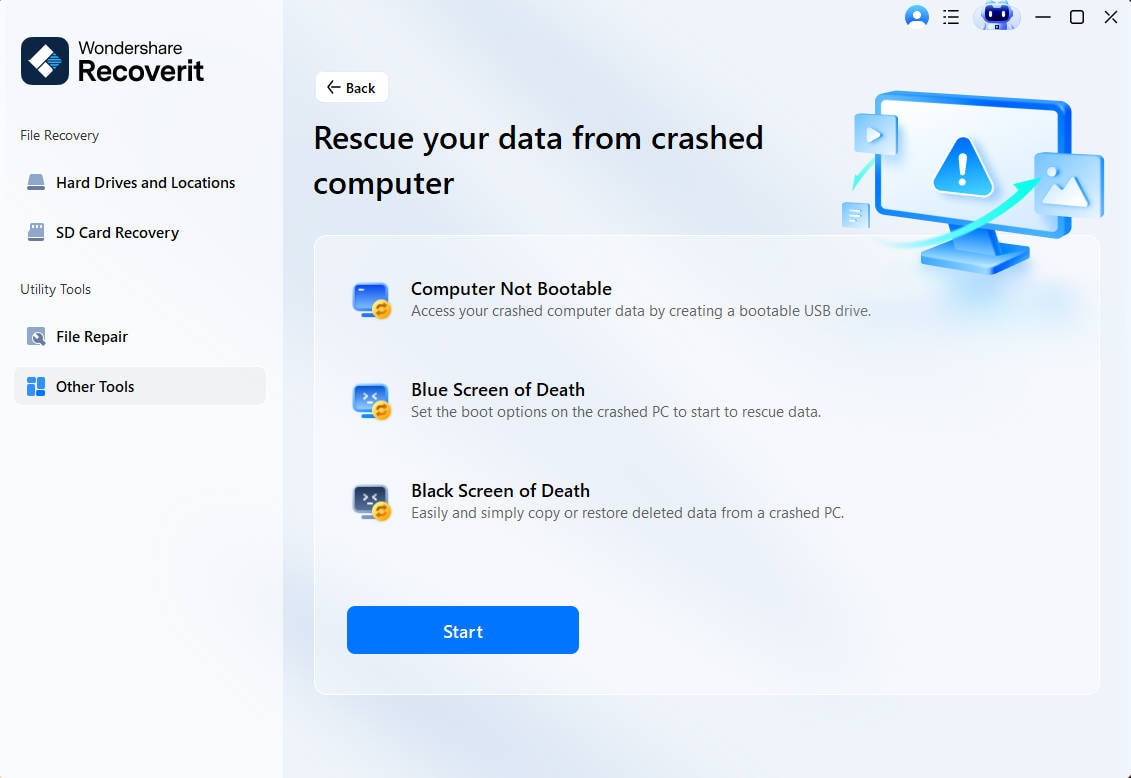
Step 2: You need to select the mode in which you want to create the actual bootable drive. The choices include bootable USB or CD/DVD.

Step 3: Make sure to have a backup of all the data in the drive. In the next section, you shall be asked to format the USB drive. Select "Format Now" to proceed further.
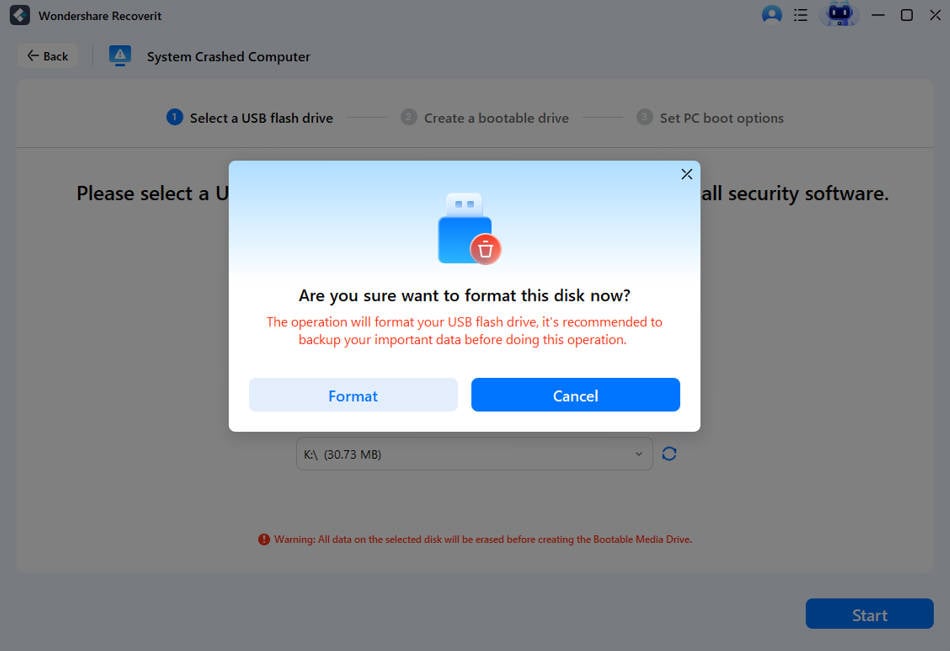
Step 4: Do not eject your drive once the process of creating a bootable drive begins.
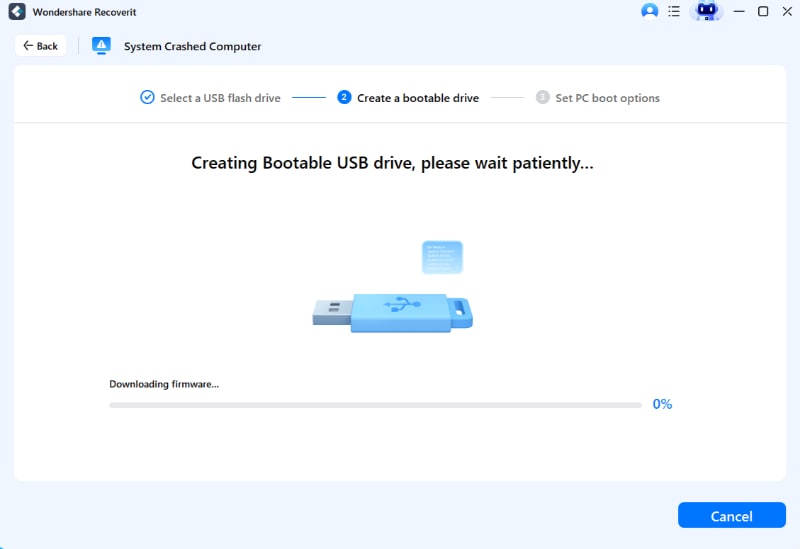
Step 5: Wait until the process is finally completed. Now, go through the steps, as mentioned in the software to recover Windows.
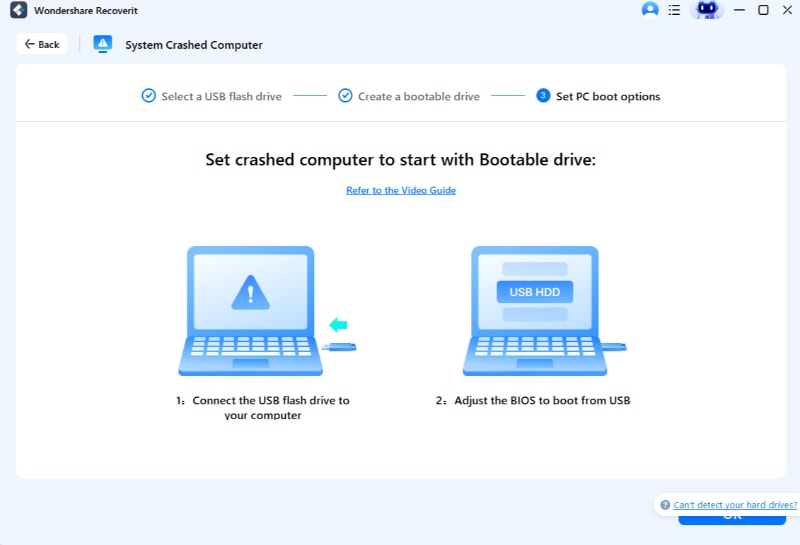
Recovering Data from Unbootable Windows 10
Once you have restarted your computer, make sure to launch Recoverit along with the bootable drive. To adjust BIOS to boot from USB drive, check out this post.
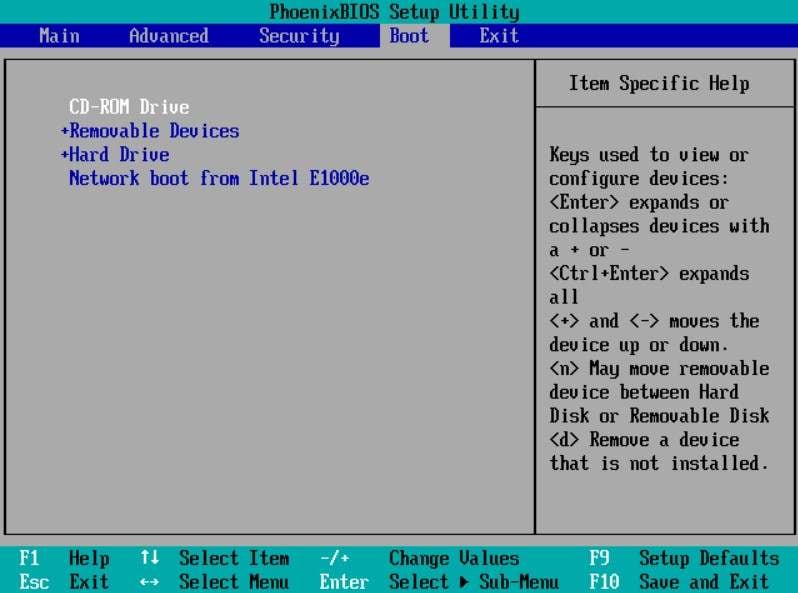
Select the option "Copy data from hard Disk," and you are good to go.
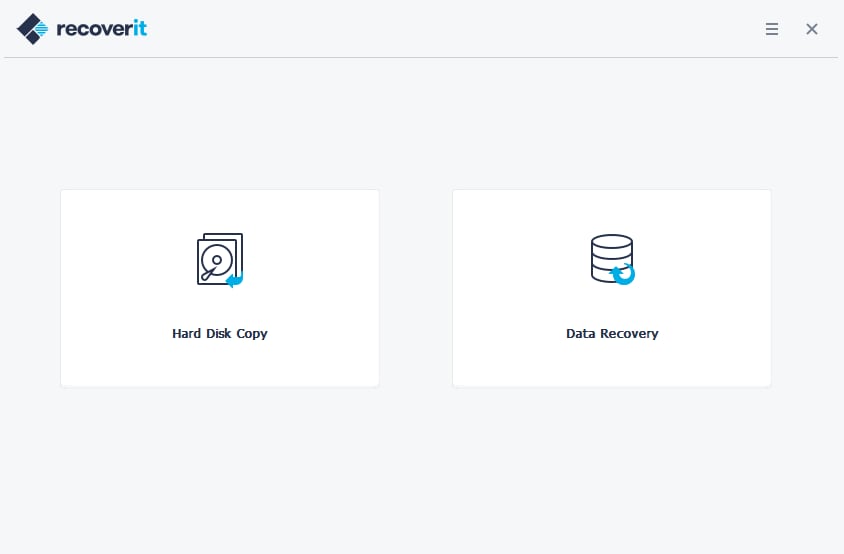
Summary
Please note that all the above-mentioned steps are properly curated for different circumstances. Finding the underlying error will certainly help you to get along fixing the problem. For instance, if it's a software issue or broken Windows update, that can be fixed with an easy. For malware attacks, it is better to opt for the recovery procedure. Once you get everything right, your PC will again start to work flawlessly as before.
Computer Troubleshooting
- Win System Crash
- Crack Bios Password
- Fix Run Dll Errors
- Fix Taskbar Disappeared Error
- Fix BootMGR Image Corrupt
- MBR Errors Fixed
- Windows Tips
- How to Edit DLL Files
- How to Test Hard Drive Speed
- Bootcamp Windows 10 No Sound Issue
- Download iCloud on PC
- Difference between File Systems
- Fix Computer Overheat
- Computer Problems
- Best Bad Sector Repair Tools
- Audio Not Working in Windows 10
- Fix Windows 10/11 Error Code 0xc000014c
- Fix Windows 10 Error Code 0xc0000034
- SMART Status Bad Error
- Fix Grub Loading Error
- Remove Admin Password
- Blue Screen Errors

 ChatGPT
ChatGPT
 Perplexity
Perplexity
 Google AI Mode
Google AI Mode
 Grok
Grok























Theo Lucia
chief Editor